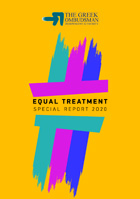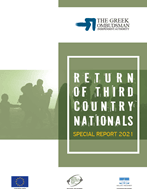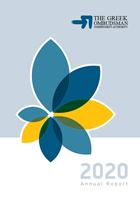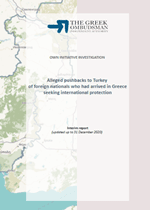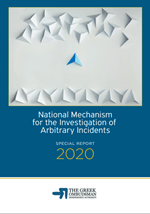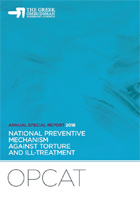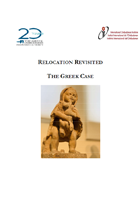Law No. 3094/2003
The new Law n.3094/2003 which has substituted the 2477/97 has introduced among others two significant additions to the Ombudsman's jurisdiction:
- The Ombudsman has assumed the mission of defending and promoting children's rights. For the protection of children's rights the Ombudsman also has jurisdiction over matters involving private individuals, physical or legal persons, who violate children's rights.
- Jurisdiction over public bodies, such as state private law entities, public corporations, local government enterprises and undertakings whose management is directly or indirectly determined by the state by means of an administrative decision or as a shareholder.
Law No. 3094, 22 January 2003
The Ombudsman and other provisions
THE PRESIDENT
OF THE HELLENIC REPUBLIC
The following law passed by Parliament
is hereby published
Article 1 : Mission | 2 | 3| 4 | 5 | 6 | 7 | 8 | 9 | 10 | 11 |
1. The independent authority entitled "The Ombudsman", has as its mission to mediate between citizens and public services, local authorities, private and public organizations as defined in article 3, par. 1 of this Law, with the view to protecting citizens' rights, combating maladministration and ensuring respect of legality. The Ombudsman also has the mission of defending and promoting children's rights.
2. The Ombudsman is assisted by five Deputy Ombudsmen, one of whom shall be appointed as Deputy Ombudsman for children. As Deputy Ombudsmen are selected individuals of recognized standing, with superior scientific qualifications and enjoying broad social acceptance. The Ombudsman and the Deputy Ombudsmen are not held responsible, prosecuted or subjected to inquiry for any opinion expressed or act committed in the discharge of their duties. Prosecution is permissible only following an accusation for slander, libel or violation of confidentiality.
Article 2 : Appointment - Term of Office | 1 | 3 | 4 | 5 | 6 | 7 | 8 | 9 | 10 | 11|
1. The Deputy Ombudsmen are appointed by decision of the Minister of Interior, Public Administration and Decentralization on the recommendation of the Ombudsman.
2. The Ombudsman may be replaced when absent or temporarily unable to perform his duties for whatever reason. The Ombudsman shall appoint one of the Deputy Ombudsmen as his substitute.
3. The Ombudsman may be removed from office if he is physically or mentally incapable of performing his duties. The Deputy Ombudsmen shall be relieved of their duties by decision of the Minister of Interior, Public Administration and Decentralization, on the recommendation of the Ombudsman, for physical or mental incapacity to perform their duties or inadequacy in executing their duties. The termination of the Ombudsman's period of office, for whatever reason, shall de facto bring the termination of the Deputy Ombudsmen's period of office, who shall continue to perform their duties until the appointment of the new Deputy Ombudsmen and in any case not later than three months following the appointment of the new Ombudsman.
4. During the term of office of the Deputy Ombudsmen, the exercise of any other public office is suspended, as well as the exercise of any other duties in any position in the public sector and legal entities of general government. Deputy Ombudsmen work under conditions of full and exclusive employment and may not have any other professional activity. Deputy Ombudsmen may, however, work part-time as members of the teaching staff of higher educational institutions.
Article 3: Jurisdiction | 1 | 2 | 4 | 5 | 6 | 7 | 8 | 9 | 10 | 11 |
1. The Ombudsman has jurisdiction over issues involving services of: a) the public sector, b) local and regional authorities, c) other public bodies, state private law entities, public corporations, local government enterprises and undertakings whose management is directly or indirectly determined by the state by means of an administrative decision or as a shareholder. Banks and the Athens Stock Exchange are exempted. Whenever the term "public service" or "public services" appears in this law, it encompasses the services that are listed in the previous paragraph. For the protection of children's rights the Ombudsman also has jurisdiction over matters involving private individuals, physical or legal persons, who violate children's rights, pursuant to the terms and conditions laid down in article 4.
2. The Ombudsman shall not have any jurisdiction over government ministers and deputy ministers for acts pertaining to their political function, religious public law bodies, judicial authorities, military services with regard to issues of national defense and security, the National Intelligence Service, the services of the Ministry of Foreign Affairs for matters related to the conduct of the Country's foreign policy or international relations, the Legal Council of State and independent authorities with regard to their main function. The Ombudsman shall not investigate cases, which concern state security. Moreover, issues pertaining to the service status of public officials also do not fall under his jurisdiction.
3. The Ombudsman shall investigate individual administrative acts or omissions or material actions of public officials, which violate rights or infringe upon the legal interests of physical or legal persons. In particular, the Ombudsman shall investigate cases in which an individual or collective public body: i) by an act or omission, infringes upon a right or interest protected by the Constitution and the legislation; ii) refuses to fulfill a specific obligation imposed by a final court decision; iii) refuses to fulfill a specific obligation imposed by a legal provision or by an individual administrative act; iv) commits or omits a due legal act, in violation of the principles of fair administration and transparency or in abuse of power.
4. The Ombudsman shall not investigate cases pending before a court or other judicial authority.
5. The Ombudsman delegates authority to the Deputy Ombudsmen and supervises and coordinates their work. The Ombudsman shall draw up an annual report, explaining the work of the Authority, presenting the most important cases and formulating recommendations for the improvement of the public services and the adoption of the necessary legislative measures.
The report of the Ombudsman is submitted in March each year to the Speaker of Parliament and discussed according to the House Rules and published in a special edition of the National Stationery Office. The Ombudsman may present to the Prime Minister and the Speaker of the House special reports during the year, which are communicated to the relevant Minister in each case.
Article 4 : Investigation Procedure | 1 | 2 | 3 | 5 | 6 | 7 | 8 | 9 | 10 | 11 |
1. The Ombudsman undertakes the investigation of any issue within his jurisdiction, following a signed complaint submitted by any directly concerned person or legal entity or union of persons. The Ombudsman may also receive complaints from any directly concerned child, or person entrusted with parental care or relative by lineal or collateral descent down to the second degree, the child's guardian or provisional guardian, or any third party having direct knowledge of the infringement of the child's rights. For the implementation of the provisions of this Law, is considered as a child any person who is not over the age of eighteen
2. The Ombudsman may also proceed to the investigation of cases on his own initiative.
3. The Ombudsman shall not investigate cases in which the administrative act has generated rights or created a favorable situation for third parties that may only be reversed by a court decision, unless there is manifest illegality or the main object of the case is related to the protection of the environment.
4. The complaint shall be lodged within six (6) months from the date on which the applicant has been fully informed of the acts or omissions for which he/she has appealed to the Ombudsman, and is recorded in a special register. The submission of the complaint shall not suspend the time limits defined by law for recourse to legal action or remedies and does not depend on any parallel application for legal redress or process of higher appeal. In the event that a special administrative appeal has been submitted, the Ombudsman shall not investigate the case until the competent body has reached a decision or a period of three months has elapsed since the submission of the administrative appeal. The Ombudsman may, before dealing with the case, ask the interested parts to make an administrative appeal. The Ombudsman may file a complaint, which is judged to be manifestly vague, unfounded or has been submitted in an abusive manner or in violation of the principle of good faith.
5. The Ombudsman may, during the investigation of cases, request the assistance of the Public Administration's Body of Investigators-Inspectors or other auditing bodies of the Administration. The Ombudsman may request public services to provide him with any information, document or other evidence relating to the case, and may examine individuals, conduct on-site investigations and order an expert's report. During the examination of documents and other evidence, which are at the disposal of public authorities, the fact that they have been classified as secret may not be invoked, unless they concern issues of national defense, state security and the country's international relations. All public services have an obligation to facilitate the investigation in every possible way. Non-cooperation with an investigation by a public service shall make the object of a special report from the Ombudsman to the competent Minister.
To ensure the protection of children's rights, the Ombudsman may request by means of a duly reasoned document, the individual cited in the complaint to provide documents and other evidence. The classification of such documents as secret may not be invoked. In such an event, the Ombudsman must safeguard the personal and professional secret of private persons and not publish information that would make it possible to identify them. Should a private individual refuse to supply such evidence, the Ombudsman may request the assistance of a public service, professional association or body, as well as the assistance of the Prosecutor's Office.
6. On completion of the investigation, if required by the nature of the case, the Ombudsman shall draw up a report on the findings, to be communicated to the relevant Minister and authorities, and shall mediate in every expedient way to resolve the citizen's problem.
In his recommendations to public services, the Ombudsman may set a time-limit within which the services have an obligation to inform him of the actions taken in implementation of his recommendations or of the reasons for which they cannot accept them. The Ombudsman may make public the refusal to accept his recommendations, if he considers that this is not sufficiently justified.
7. When the complaint is aimed against a private person, the Ombudsman shall take all necessary action to put right the problems brought to his attention and propose all required measures for the protection of the rights of the child concerned. In particular, when the operating conditions of a private law entity, infringe the child's rights, he may propose the necessary organization and operation measures. The legal entity, must inform the Ombudsman of the measures it has adopted or intends to adopt, within the fixed deadline. The Ombudsman may make public the refusal to accept his recommendations, if he considers that this is not sufficiently justified.
8. The Ombudsman shall, in all cases, inform the citizen concerned of the outcome of his/her case.
9. The Office of the Ombudsman's staff have a duty of confidentiality with regard to documents and evidence which come to their knowledge in the context of an investigation and which are classified as secret according to the provisions in force, or are exempted from the right of access to administrative documents, in accordance with article 16 of the Code of Administrative Procedure and all other relevant provisions.
10. The refusal of a public official or administration member to cooperate with the Ombudsman during an investigation constitutes a disciplinary offence of breach of duty, and for administration members, a reason for their replacement.
If during the course of the investigation, it is established that there has been unlawful behavior on the part of a public official, civil servant or member of an administration, the Ombudsman shall submit the report to the competent body and may call for disciplinary action against the person responsible or recommend the adoption of other measures, if the person responsible is not subject to disciplinary control. The Ombudsman may define a reasonable time limit, in view of the circumstances, at the expiry of which, if no action has been taken, he may himself order the control. The Ombudsman may also in serious cases call, by means of a document addressed to the competent body, for disciplinary action against the responsible public official or civil servant for the above omission in exercising the indicated control. If it emerges from the reports of the Ombudsman that a public official or civil servant, for the second time within a three-year period, has obstructed the progress of an investigation or refuses without serious reason to cooperate in the solution of a problem, the penalty of definitive dismissal may be imposed.
11. If there is sufficient evidence that a public official, civil servant or member of an administration has committed a criminal act, the Ombudsman shall also communicate the report to the competent Public Prosecutor. If the intervention of the relevant judicial authority or other public service or body is deemed necessary with the view to protecting children's rights, the Ombudsman shall communicate the relevant report to them.
Article 5 : Senior Investigators - Assistant Investigators Secretariat | 1 | 2 | 3 | 4 | 6 | 7 | 8 | 9 | 10 | 11 |
1. 75 positions are established for senior investigators and 50 for assistant investigators under private law work contracts of indefinite duration. The following qualifications are required for selection:
a) For senior investigators, those laid down in par. 1 of article 2 of Pres. Decree 50/2001 (Official Gazette 39 A') "Determination of qualifications required for appointment to public bodies"
b) For assistant investigators, a degree from a Greek university or an equivalent degree from a foreign university and knowledge of a foreign language.
c) Provisions on maximum age-limit for appointment shall not apply. The status of pensioner does, however, constitute an impediment for appointment to the above posts.
The provisions of the first and second subparagraph of article 4 of Law 3051/2002 (Official Gazette 220 A') on "Constitutionally established authorities, amendment and supplementation of the recruiting system for the public sector and related arrangements" shall also apply for the positions of assistant investigators of this article.
Experience is an aspect that is particularly appreciated in the evaluation of candidates. Experience means having been involved in work connected with the object of the vacant post or employed with an independent authority with a mission similar to that of the Ombudsman.
A public announcement is issued for the positions of senior and assistant investigators, which is published in at least two Athens newspapers with a wide circulation and in all cases the principles of publicity, transparency, objectivity and meritocracy are respected.
The announcement may, in each case, specify the basic and post-graduate degrees, the foreign language and level of proficiency, the experience, as well as the computer skills that are required. The provisions of article 28 of Pres. Decree 50/2001 shall apply for determining the level of proficiency in the foreign language. The selection of investigators and other staff members is carried out by a 5-member committee composed of the Ombudsman as Chairman, two Deputy Ombudsmen and two university professors appointed by the Authority. The provisions of Pres. Decree 291/1998 "Regulation on the recruitment procedure for the Ombudsman's staff" shall apply for all staff selection issues, which are not included in the announcement or regulated by this article.
2. The criteria, the time, the frequency, the form, the procedure for the evaluation of senior and assistant investigators as well as the relevant body, shall be decided by the Ombudsman.
3. Up to twenty-five (25) civil servants, whether permanent officials or employees under private law work contracts of indefinite duration, employees of the public sector, local and regional authorities, public and private law entities, who fulfill the requirements of par. 1 of this article 3 or civil servants who are university graduates with at least eight years in service and excellent knowledge of a foreign language shall be seconded to the Ombudsmen as senior investigators. The selection of civil servants to be seconded follows the procedure of paragraph 1 above. The secondment is effected by decision of the relevant Minister on the recommendation of the Ombudsman, in derogation from any general or special provision. The duration of the secondment is three years and may be renewed one or more times for an equal period and is compulsory for the employee's service record. The provision shall also apply to the secondments that have been extended pursuant to par. 3 of article 28 of Law 3013/2002.
4. Subject to the provisions of par. 4 of article 4 of Law 3051/2001, the remuneration of senior and assistant investigators is determined by joint decision of the Ministers of Economy and Finance and Interior, Public Administration and Decentralization, on the Authority's recommendation. Until the issuing of the above joint ministerial decision, provisions in force at the time of publication of this law shall apply. The other staff members of the Authority shall receive the remuneration provided by provisions in force.
5. The senior investigators, the assistant investigators and the seconded officials who perform the duties of senior investigators may, in the event that proceedings have been instituted against them for acts or omissions in the execution of their duties, be represented by members of the Legal Council of State before the courts.
6. Civil servants who have been seconded to the Authority, in whatever way, shall receive their full remuneration, as well as any other allowances, fees, benefits and compensations of their service position, with the exception of the allowance for position of responsibility and the benefits attached to active execution of duties in the organization from which they were seconded. They shall also receive the additional special fee provided for in par. 4 of article 4 of Law 3051/2002. The provisions of paragraph 10 of article 21 of law 2733/1999 (O.G .180 A') shall also apply to the service of officials seconded to the Ombudsman pursuant to the above paragraph 3.
7. The Authority's Secretariat shall be headed by a public official with the grade of director of article 79, par. 2 of the Civil Servants Code (Law 2683/1999). The post of director established by this article shall be filled by decision of a special council composed of the Ombudsman as Chairman and the Deputy Ombudsmen as members, following a candidacy application submitted within a final deadline, which is determined in a public invitation to the interested parties. The application is accompanied by a CV with the information contained on the official's personal record. Only permanent officials of public services, public organizations, local government and independent authorities who have the qualifications for promotion to the grade of director in accordance with par. 2 of article 82 of the Civil Servants Code (Law 2683/1999) may present candidacy applications. The Special Council invites candidates for an interview in order to form an opinion about their abilities and personality, with respect to the execution of their duties. The provisions of par. 1 of this article regarding the taking into account and the meaning of experience shall apply accordingly for the selection of the director.
The official who will be selected as set forth above for the post of director shall be transferred, in derogation of any general or specific provision, by decision of the competent Minister, without the opinion of the service board and promoted by means of the same decision to the grade of director.
When this provision is implemented for the first time, the selection of the individual who will fill the post of director will be made within two (2) months from the coming into force of this law. The secondment of the director in conformity with par. 3 of article 5 of law 2477/1997 shall end as soon as the above transfer has been completed and the period of secondment considered, for all intents and purposes, as a period of service in a director's grade position of article 79 of the Civil Servants Code (Law 2683/1999).
Article 6 : Title of the Authority | 1 | 2 | 3 | 4 | 5 | 7 | 8 | 9 | 10 | 11 |
No natural or legal person may use the title of "Ombudsman" or a similar title, which may cause confusion among the public with respect to the above Authority.
Article 7 : Final and transitional provisions | 1 | 2 | 3 | 4 | 5 | 6 | 8 | 9 | 10 | 11 |
1. The positions of senior investigators of par. 1 of article 5 of Law 2477/1997, as amended by par. 1 of article 28 of Law 3013/2002 and the positions of junior investigators of par. 4 of article 8 of Law 2623/1998 shall be maintained and abolished on the termination of the work contract of persons appointed to these posts or before it, should they become vacant in any other way.
2. The provisions of par. 2 of article 10 of Law Decree 216/1974, as amended and supplemented, shall also apply to the secondment of civil servants to the Office of the Ombudsman. The provisions of par. 8 of article 5 of Law 3051/2002 shall also apply to the permanent staff of local government and independent authorities that have been seconded to the Office of the Ombudsman.
3. General or specific provisions that are contrary to the provisions of this Law shall be abolished. The provisions of par. 1 of article 8 of Law 2623/1998 (O.G. 139 A'), as in force each time shall remain applicable and one (1) additional position created to meet the requirements of the Deputy Ombudsman.
4. For the first recruitment for the posts of senior and junior investigators, following the entry into force of this Law, the committee of article 5, par. 1 of this Law will be composed of the Ombudsman, two (2) university professors and two (2) members or former members of independent administrative authorities.
Article 8 : | 1 | 2 | 3 | 4 | 5 | 6 | 7 | 9 | 10 | 11 |
The following phrases are added at the end of paragraph 6 of article 15 of Law 2266/1994 (O.G. 218 A'):
" Secondment of heads of division from a position in the civil service, public or private law organization, shall be effected in derogation from existing provisions. The period of service shall be taken into account for the official's promotion to the next grade. This provision shall enter into force as from November 1st, 2002".
Article 9 : | 1 | 2 | 3 | 4 | 5 | 6 | 7 | 8 | 10 | 11 |
A second subparagraph is added to case b' of par. 3 of article 1 of Law 3074/2002 (O.G. 296 A'), which reads as follows:
" His term of office will be five years and may be renewed according to the same procedure".
Article 10 : | 1 | 2 | 3 | 4 | 5 | 6 | 7 | 8 | 9 | 11 |
The Hellenic Institute of Administrative Science is subsidized annually beginning from financial year 2004, form the ordinary budget of the Ministry of Interior, Public Administration and Decentralizations, for the purpose of meeting its costs of operation and participation in the scientific events of the International Institute of Administrative Science.
The subsidy's amount is determined by decision of the Minister of Interior, Public Administration and Decentralization that is issued following a reasoned opinion of the Institute's Board of Directors and may not exceed the sum of 14,674 Euros annually. This amount can be readjusted by joint decision of the Ministers of Economy and Finance and the Interior, Public Administration and Decentralization.
For the years 2002 and 2003 the Hellenic Institute of Administrative Science will retain as subsidy the amount that was not spent from the subsidy it received from the 2001 Public Investment Program for the organization of the 25th International Conference of Administrative Science, in conformity with article 26, par. 8 of Law 2738/1999 (O.G. 180 A').
Article 11 : Validity | 1 | 2 | 3 | 4 | 5 | 6 | 7 | 8 | 9 | 10 |
This law shall enter into force as from its publication in the Official Gazette, unless otherwise stipulated in its individual provisions.
Athens, 22 January 2003
THE PRESIDENT OF THE REPUBLIC
CONSTANTINOS STEFANOPOULOS
THE MINISTERS
OF ECONOMY OF INTERIOR,
AND FINANCE PUBLIC ADMINISTRATION
AND DECENTRALIZATION
Authenticated and sealed
Athens, 22 January 2003
The Minister of Justice
Ph. Petsalnikos




